Or how to train your sensory organs to experience the world more closely
When was the last time you sat down and fully experienced experience? Meditation and wine does that for me every time, but at times a glass of wine can be more fun. As humans in the 21st century we’re not really used to using our sensory organs very much. We hide inside to protect from the cold / heat. We eat heavily salted and spiced foods to try to bring some inch of taste experience to the forefront of our consciousness. We tend to confuse our sensory input with thoughts. It’s 8C outside, must be cold. But is it really? Whether it is or not probably depend on the wind, sun, rain — a whole range of our parameters and not just the temperature.
Turning the topic back to wineing and dining. I had a major revelation regarding meat recently, where I suddenly realized by paying close attention that what I thought was the taste of meat was really the taste of the sauce and the spices and the vegetables. The meat does little else than add texture to a dish IMO. Which can be important enough, but I clearly had confused texture with taste. I thought I needed meat for the dish to taste less bland, but I realized that I don’t.
Learning to use your senses properly increases the resolution of the world you perceive. And wine is an excellent medium to start training your senses and increase the resolution. Here are the 6 levels of sensory experience (that I’ve reached so far) when it comes to training your senses with wine.
👶 Level 1: “It’s wine”
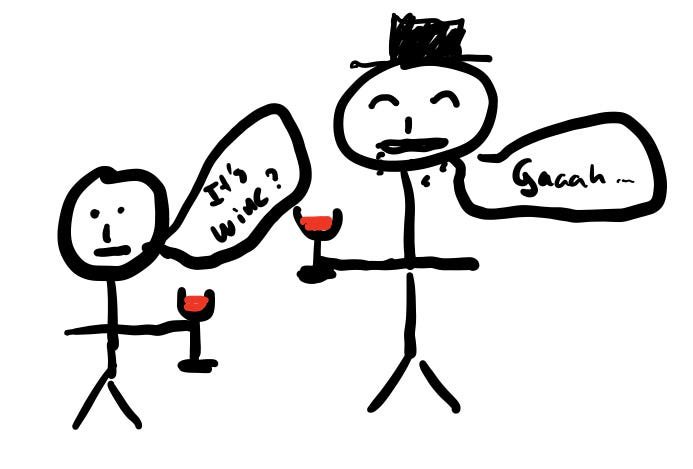
We’ve all been there. Somebody is clearly receiving some kind of nasal and oral orgasm from sniffing and drinking a glass of wine and then they ask you the dreaded: “What do you taste?”. You sniff the glass, you sip, your mind is racing depending on the level of social pressure you’re in, you may begin to sweat and finally you utter: “Tastes like … wine?”. That’s it: You’re level 1.
At this point though you’re very likely confusing your sense of smell and taste with your sense of vision. You see the glass in your hand, your know it’s wine, so you answer “it’s wine”. This is the first hint towards realizing that there’s a level of experience that you’re not experiencing. Maybe you read a wine review and thought “that’s bullshit, nobody can taste white flowers and fresh peach in glass of wine”.
🧒 Level 2: “Maybe strawberry?”
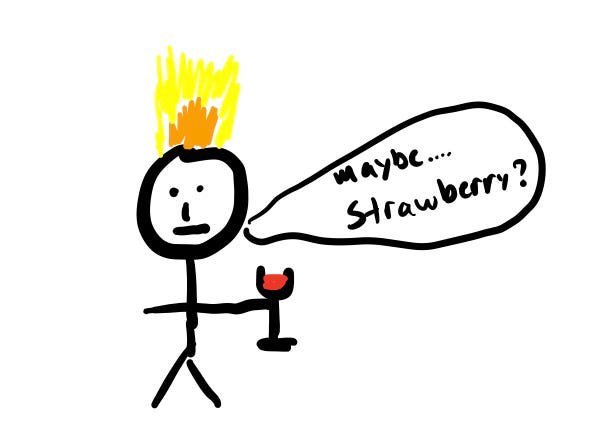
You might leave the encounter from level 1 thinking “what a pompous jerk”. But you might also leave intrigued or maybe something else triggers you to think that there might be something there that you’re missing. If that’s the case you start paying a bit more attention to what your sensory organs actually tell you and not just what your mind tells you. The next time you have a glass of wine in your hand you stick your nose in, take a sip and think hard. “Maybe strawberry?” That’s it! You have very likely just identified your very first aroma or flavor in a glass of wine.
You might notice that I wrote aroma or flavor. They’re not the same thing. An aroma is something you smell and a flavor is something you taste. Where did you sense the strawberry? When you smelled it? Or when you tasted it? In any case, very roughly 80% of tasting is actually smelling due to the passage from the back of your mouth to your nose. But as it turns out some aromas or flavors are more easy to detect one way or the other.
🎩 Level 3: Black currant, eucalyptus, and a hint of toast and vanilla
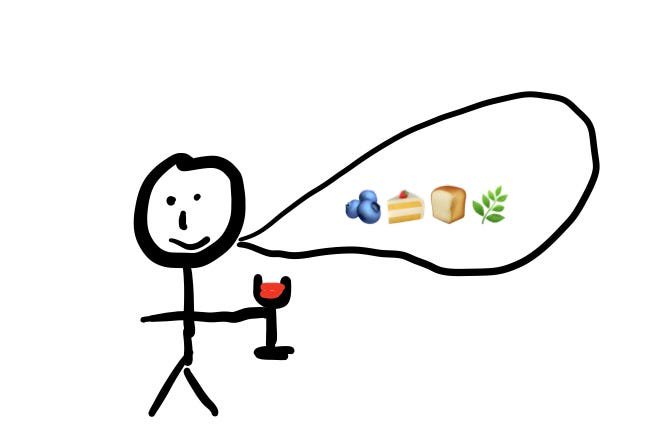
Then you start going deeper. You try to smell more things. You pay attention to what you experience. Maybe you buy the Winefolly book and learn that different wines have different aroma / flavor profiles. So you start to more or less structured go through the different smells you know in your head, thinking: “Is this red fruit? Black fruit? Herbs? Vegetables? Stones?” And you learn to mentally check off each item as you settle on one. “Red fruit, yes this is strawberry and perhaps raspberry” you think. So the more you “practice” (as we call “drinking wine” in the wine biz) the better your resolution of identifying aromas/flavors become.
But then you happened upon a video of wine expert drinking a glass of wine. You saw how they slurped the wine and almost chewed it. Then one day you try the same and … 🤯
🏠 Level 4: Dry, med+ tannins, high acidity, med alcohol, med+ body, med+ intensity and med+ finish
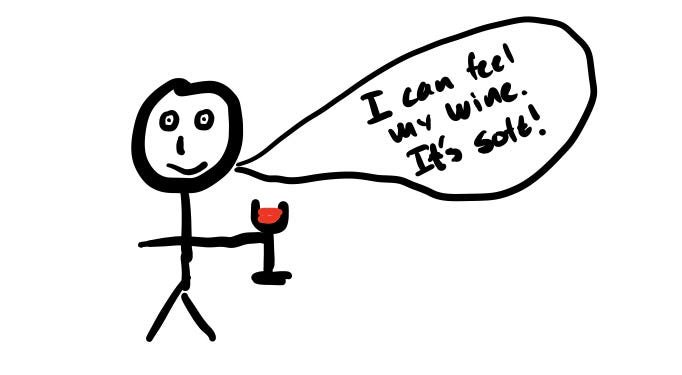
In one instance you realize that there’s a whole set of the experience you have been ignoring: How the wine feels. This is something that you can only sense on your palate. How sweet is it? How tannic is it? Is the acidity high or low? How about alcohol level? Body? Intensity and how long is the finish? All these parameters has a just as important impact on how you experience the wine. Once you realize that you start to get to know a lot better what you like. “Oh I don’t like Pinot Noirs because they’re always thin and acidic” and “Gimme more of that full bodied, juicy vanilla bomb of a Chardonnay”.
Then one day you start to think about how vanilla ended up in your wine. “I mean I can understand the fruit flavors, but vanilla? Did somebody put it in there?”
🧑🎨 Level 5: “I like heavily oaked Chardonnay and Zinfandels”
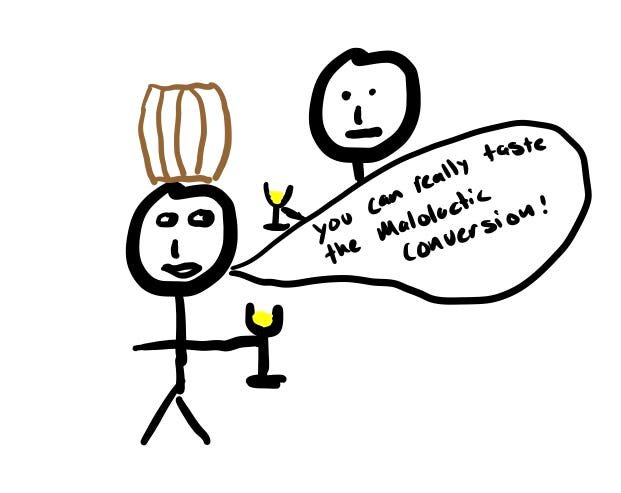
That’s when you realize that the lovely full-bodied Chardonnays that you so enjoy is made in the winery. You realize that it’s because the winemaker aged it in new oak (or more likely with oak staves) and the new oak imparted flavors of vanilla into the wine . You learn that the buttery notes you sometimes get in these come from something called malolactic conversion. Even though you have no clue what it is, you still say it at awkward moments when you drink a glass of wine with your friends “Oh you can really taste the malolactic conversion in this thing”.
Then one day somebody served you a glass of red wine, blind. He just tells you to try it. You don’t know what it is. “Hmm medium ruby color, strawberry, raspberry, red cherries, vanilla, dry, medium tannins, medium acidity, med alcohol, med body (maybe even med+ body), med intensity, medium finish. Hmm is this a Pinot Noir, that I so hate? No it can’t be. It’s too juicy, too fruity, too pleasant on the palate.” Finally you ask what it is and your host says it’s a Pinot Noir and your mind explodes.
🌍 Level 6: It’s all connected!
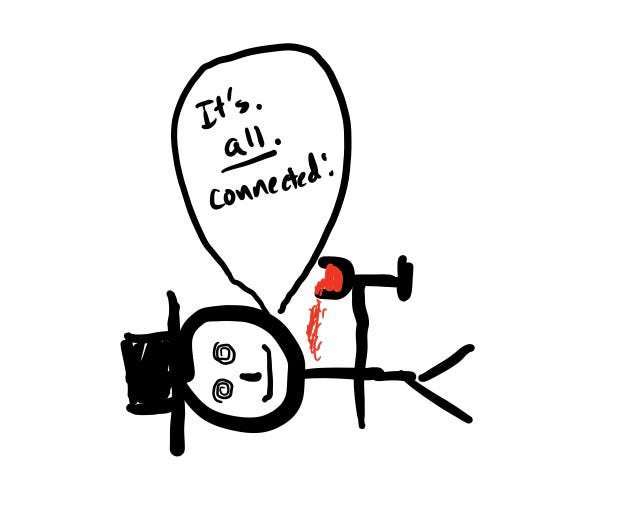
Why did this Pinot Noir taste and especially feel so different than all other Pinot’s you’ve tried? It’s from a warm climate. Acidity is lower. The winemaker worked the cap a lot to ensure the deeper color and higher tannins. The fruit flavors are more present, more warm. You realize that you don’t hate Pinot Noir’s you just hate poorly made ones. You realize that when we turn grapes into wine they express the climate and soils they’re grown in. That slightly smoky, matchstick like aroma you always got from a Chablis? You realize that is due to the rocky fossilized old oister shells the vines stood on. But you also learn that winemakers can use cheap tricks to make a bad wine palatable. Suddenly you hate full bodied vanilla bomb Chardonnays because of what they stand for: Shit grapes, grown in a blistering hot climate, with lots of irrigation, made with fake oak, in an industrial agriculture system where nothing is alive except the zombie grapes that grows plump and sugary on the vines. You start to appreciate the light bodied Pinot Noirs with their fragile earthy, floral, red fruit aromas with maybe a slight hint of bell pepper because you then know that the winemaker really struggled with cold weather that year.
Every wine you taste suddenly tell a story. A story of what the weather was like. How the grapes were harvested. How they were fermented. How they were matured. And much more, which I can only believe must expand as you grow better at identifying and associating the minute details of this magical beverage with the environment it was made in.
Cheers 🍷🍷